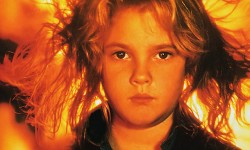Review: The Umbrellas of Cherbourg
1964 was an important year in the career of French filmmaker Jacques Demy. Having already made two feature films, Lola (1960) and Bay of Angels (1962), Demy made an international splash with his third feature film, The Umbrellas of Cherbourg (1964). Borrowing numerous elements from American musicals, Demy created a sumptuous musical that was, and still is, a treat for the eyes and the ears.
The film tells the story of the ill-fated love affair between a 20-year-old mechanic named Guy Foucher (Nino Castelnuovo) and his 17-year-old girlfriend, Geneviève Emery (Catherine Deneuve). Their romance begins in 1957 in the port town of Cherbourg. Against the orders of Geneviève’s mother (Anne Vernon), who runs the local umbrella shop, the two plan to marry. Time plays a cruel trick on the starry-eyed lovers and before they can elope, Guy is drafted to Algeria for two years. Guy and Geneviève promise to wait for one another and the two spend a passionate night together. Guy’s departure not only leaves Geneviève feeling alone, but she soon discovers she is pregnant. Upon discovering the unplanned pregnancy, Geneviève’s mother begs her daughter to marry a charming gem dealer, Roland Cassard (Marc Michel), in order to avoid scandal, but Geneviève still has hope that Guy will return. After months of Guy’s absence, Geneviève begins losing hope and finds herself torn between marrying Roland, the man who loves her, and waiting for Guy, the man she loves. Ultimately, she makes a decision that will lead to a life of regret for happiness she could have had.
With The Umbrellas, Demy fashions a self-contained world, one that is marked by a unique quality: every piece of dialogue is sung. This song-filled world helps intensify the emotional moments of the film, making them much more raw and heartbreaking for the viewers. Suddenly, Guy’s departure is no longer a sad moment, but a tragic one. Geneviève’s fragile voice cries out for her lover as the train departs and the elegant score swells. Demy’s long-time collaborator, Michel Legrand, wrote the score that beautifully accompanies the poignancy and the heartbreak of Guy and Geneviève’s doomed relationship.
The true treat of The Umbrellas is Jean Rabier’s cinematography, which meticulously captures every color, fabric, and emotion that Demy sought to portray. The luscious cinematography not only creates a fantasy world, but it also hides the cruel reality that lurks beneath the surface. Vibrant colors and beautiful songs dominate the idyllic world, but when true emotions become too intense, the colors begin to fade and the songs become more depressing. The best example is the final encounter in 1963 between Guy and Geneviève, which is covered in a white blanket of snow. The lack of color allows the two to regret their decisions and reconcile with the fact that they will never be together. Demy skillfully deconstructs these moments, separating them from the fantasy world that he created. The characters are forced to reconcile with their emotions in a naked world while the spectators are forced to pull out their tissues and wipe away their tears.
The Umbrellas of Cherbourg brilliantly showcases Demy’s love for fantasy worlds and film musicals, as well as his skill as a director. He pushes the limitations of filmic discourse, experimenting with elements that were never before seen in the genre. The result of his experimentation is a new cinematic world, one whose ordinary language is replaced by Jacques Demy’s brilliant lyrics and Michel Legrand’s tear-jerking score.
Related Posts
Jose Gallegos
Latest posts by Jose Gallegos (see all)
- Brian De Palma Retrospective: Murder a la Mod (1968) - September 10, 2013
- Brian De Palma Retrospective: An Introduction - September 8, 2013
- TIFF’s Bitter/Sweet The Joyous Cinema of Jacques Demy Review:A Slightly Pregnant Man (1973) - July 11, 2013
-
http://www.facebook.com/profile.php?id=22100906 Adam Kuntavanish
-
http://twitter.com/katdoingstuff Kat
-
http://twitter.com/NextProjection Christopher Misch























